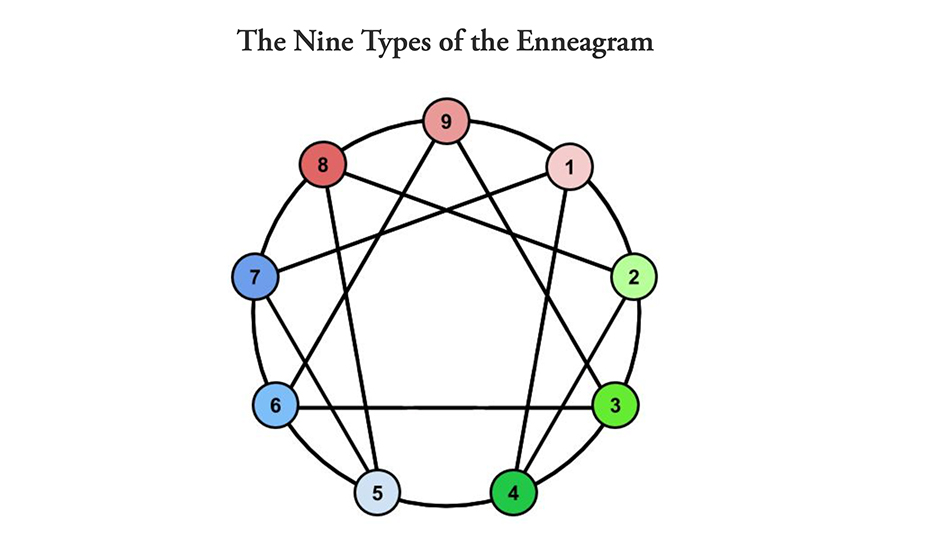
TYPE ONE: THE IMPROVER
- Ethical, dedicated, reliable, rigid, critical of self and others, perfectionist
- Focus on what’s wrong or on what could be “better”
- Motivated by a desire to live the right way, improve the world
- Avoid fault, blame, and criticism
TYPE TWO: THE HELPER
- Warm, friendly, serving, others-oriented, indirectly self-serving
- Focus on being connected to others
- Motivated by a need to be liked/loved or be needed
- Avoid rejection, acknowledging and expressing own needs
TYPE THREE: THE PERFORMER
- Success-oriented, high achieving, image-conscious, shapeshifting
- Focus on tasks, goals, success, image
- Motivated by a need to be (or appear) successful
- Avoid failure (and appearing to fail)
TYPE FOUR: THE ROMANTIC
- Creative, emotionally/aesthetically sensitive, moody, self-absorbed
- Focus on emotions, the state of relationships, authenticity, strive for what’s missing, feeling different, feeling “I’m not enough”
- Motivated by a need to be understood and to experience their oversized feelings
- Avoid being ordinary or like others
TYPE FIVE: THE INVESTIGATOR
- Analytical, objective, private, detached/withdrawn
- Focus on knowledge, privacy, managing energy/space/resources
- Motivated by a need to gain knowledge, conserve energy
- Avoid relying on others, emotions
TYPE SIX: THE LOYALIST
- Committed, practical, analytical, and skeptical/doubtful
- Focus on risk, danger, and threats; preparing for the worst
- Motivated by fear and the need to feel safe and secure
- Avoid uncertainty and spontaneity
TYPE SEVEN: THE ENTHUSIAST
- Fun, upbeat, spontaneous, adventurous, frenetic, evasive
- Focus on pleasure, positives, possibilities
- Motivated by a need to be happy, to plan stimulating/exciting experiences
- Avoid pain, discomfort, negatives
TYPE EIGHT: THE CHALLENGER
- Commanding, powerful, intense, confrontational, dominating
- Focus on power and control
- Motivated by a need to be strong
- Avoid feeling week or vulnerable, being exploited or betrayed
TYPE NINE: THE PEACEMAKER
- Pleasant, laid back, accommodating, emotionally steady, procrastinating, self-forgetting
- Focus on others, what’s happening in the environment
- Motivated by a need to keep the peace, achieve harmony, merge
- Avoid conflict, anger, separation from others
What Is the Enneagram?
The Enneagram is a personality model that can help us better understand ourselves and the relationships we have with others. The model has 9 personality types that are identified by a corresponding number for each one. As a resource, the Enneagram can be used to help us feel understood, as we discover our number, and bring lightbulb moments of understanding to relationships in our lives.
In our practice, we are Enneagram-Informed, and as a staff, we have studied the book The Road Back to You by Ian Morgan Cron and Suzanne Stabile.
What the Enneagram Teaches Us:
– Why we do what we do
– What our needs, fears, strengths, and blind spots are
– How to turn off our natural instinct to be responsive vs. reactive
– How to further develop ourselves for healthier relationships
– How to communicate with others the perspective we bring and the internal motivators we carry
Four Areas of Application:
1. In our view, our personalities are molded through both nature and nurture, by God who created us and by our earliest experiences and relationships in life with our caregivers. The Enneagram is unique because it considers experiences from childhood and the wounding messages or beliefs we internalized in childhood. We believe caregiver attachment relationships from early life continue to have an impact on us as adults. Therefore, all of the types of counseling services we offer address attachment, including counseling with children, teens, adults, and couples.
2. The Enneagram is also unique because it describes a key motivation for each personality type. Rather than our personality types being based on our actions, they are based on “the why” behind our actions. The motivations describe how we find purpose and meaning and how we view the world and relationships. Our motivations impact how we interact with others, how we interpret others’ actions, and how we view ourselves.
3. Stressful phases of life and growth phases of our lives are also addressed. The Enneagram raises awareness about how our personalities naturally adapt and react to stress in negative ways and react to relief from stress in positive ways, as well as empowering us to be self-aware and to proactively choose how to respond in any situation. The Enneagram is a spectrum, with the personality types sharing some characteristics and actions, depending on if we are reacting to stress, feeling relief, or intentionally responding. However, the unique, key motivation for each personality type always remains the same.
4. In addition to self-examination and opportunities for improving relationships in our lives, the Enneagram also shows us characteristics of God that are exhibited in each personality type. Each type has its strengths and weaknesses, and based on our type, we each have a spiritual message to consider and steps to take for spiritual growth.
We are here to help



